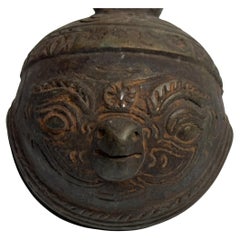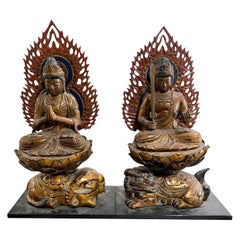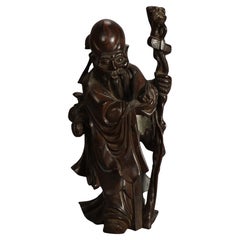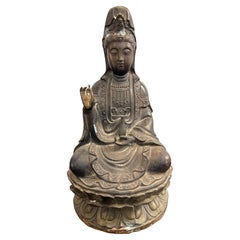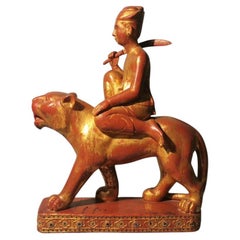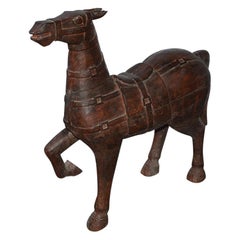Sculptures and Carvings
19th Century Burmese Antique Sculptures and Carvings
Bronze
Early 20th Century Japanese Meiji Sculptures and Carvings
Wood, Giltwood, Lacquer, Paint
Early 20th Century Asian Sculptures and Carvings
Rosewood
19th Century Chinese Qing Antique Sculptures and Carvings
Bronze
Early 18th Century East Asian Antique Sculptures and Carvings
Wood
Late 19th Century Chinese Tang Antique Sculptures and Carvings
Wood
1950s Italian Mid-Century Modern Vintage Sculptures and Carvings
Marble
Mid-20th Century Chinese Chinese Export Sculptures and Carvings
Brass, Pewter
20th Century Chinese Sculptures and Carvings
Mother-of-Pearl
Early 20th Century Indian Anglo Raj Sculptures and Carvings
Hardwood
15th Century and Earlier Pakistani Adam Style Antique Sculptures and Carvings
Rock Crystal
Mid-20th Century Chinese Chinese Export Sculptures and Carvings
Jade, Metal
19th Century Burmese Rustic Antique Sculptures and Carvings
Glass, Wood, Lacquer
Mid-20th Century Japanese Showa Sculptures and Carvings
Bronze
Early 20th Century Asian Anglo-Indian Sculptures and Carvings
Teak
20th Century Mid-Century Modern Sculptures and Carvings
Ceramic
Mid-20th Century Japanese Art Deco Sculptures and Carvings
Iron
Early 18th Century Indian Agra Antique Sculptures and Carvings
Stone
Mid-20th Century Chinese Sculptures and Carvings
Stone, Jade
Late 20th Century Chinese Sculptures and Carvings
Marble
20th Century Chinese Tang Sculptures and Carvings
Stone
19th Century Japanese Edo Antique Sculptures and Carvings
Wood
19th Century Antique Sculptures and Carvings
Stone, Brass
1890s Chinese Chinese Export Antique Sculptures and Carvings
Giltwood
Mid-20th Century Japanese Mid-Century Modern Sculptures and Carvings
Wood
Late 19th Century Chinese Tang Antique Sculptures and Carvings
Bronze
Early 2000s Japanese Showa Sculptures and Carvings
Metal
Early 20th Century Chinese Chinese Export Sculptures and Carvings
Wood
19th Century Chinese Antique Sculptures and Carvings
Early 20th Century Japanese Taisho Sculptures and Carvings
Stone
Early 20th Century Burmese Sculptures and Carvings
Bronze
1880s Japanese Meiji Antique Sculptures and Carvings
Bronze
Early 20th Century Thai Sculptures and Carvings
Stone
Early 20th Century Japanese Taisho Sculptures and Carvings
Stone
1920s Vintage Sculptures and Carvings
Bronze
20th Century Thai Other Sculptures and Carvings
Wood
20th Century Chinese Sculptures and Carvings
Jade
15th Century and Earlier Chinese Antique Sculptures and Carvings
Stone
1930s Vintage Sculptures and Carvings
Ceramic
19th Century Antique Sculptures and Carvings
Wood
Mid-17th Century Chinese Ming Antique Sculptures and Carvings
Hardwood
Mid-20th Century Chinese Sculptures and Carvings
Porcelain
19th Century Asian Antique Sculptures and Carvings
Bronze
1960s Danish Vintage Sculptures and Carvings
Metal
Late 18th Century Japanese Edo Antique Sculptures and Carvings
Boxwood
20th Century Unknown Sculptures and Carvings
Fiberglass
Early 1900s Chinese Qing Antique Sculptures and Carvings
Boxwood
Early 1900s Nepalese Antique Sculptures and Carvings
Stone
Early 20th Century American Sculptures and Carvings
Wood
19th Century Chinese Other Antique Sculptures and Carvings
Jade
1960s American Vintage Sculptures and Carvings
Metal
19th Century Chinese Antique Sculptures and Carvings
Agate
20th Century Japanese Sculptures and Carvings
Wood
Late 19th Century Antique Sculptures and Carvings
Jade
Late 20th Century Indian Sculptures and Carvings
Wood
Early 20th Century Chinese Qing Sculptures and Carvings
Sandstone
Mid-20th Century Japanese Sculptures and Carvings
Marble
20th Century Tibetan Sculptures and Carvings
Bronze
1950s Asian Mid-Century Modern Vintage Sculptures and Carvings
Rattan
15th Century and Earlier Thai Antique Sculptures and Carvings
Sandstone
Asian Sculptures and Carvings for Your Home Decor
Asian sculptors have worked in materials including wood, bronze and jade. Artists and artisans have used traditional techniques to depict deities, scenes from culture and more, and today, antique Asian sculptures and carvings are a popular choice for provocative and sophisticated home decor.
In China, the Qing dynasty, from the mid-17th century to the early 20th century, brought about significant changes in art while preserving traditional culture. Many emperors during this period were patrons of the arts, such as painting, calligraphy and decorative arts. This era saw the building of new Buddhist temples, which were decorated with statues. Some of these sculptures were adorned with colorful cloisonné decoration, in which tiny compartments, or cloisons, made by soldering copper filaments to a metal surface were filled with vibrantly hued enamel.
From the 17th to mid-19th century in Japan, kimonos were worn across classes and often fastened with a netsuke, a type of small carved toggle. Artists carved these from ivory, wood, shells and coral, creating animals, flowers and mythical creatures. During the Japanese Meiji period, spanning from 1868–1912, the country began trading internationally after centuries of isolation, allowing artists to sell their work overseas. Bronze sculpture flourished around this time for creating teapots, vases and incense burners.
Asian sculpture continued to evolve in the 20th century. During the Japanese Shōwa era, from 1926–89, art was influenced by international modernist movements like abstraction, Futurism and Surrealism. Contemporary Asian sculptures and carvings continue to combine global influences and a rich heritage of technique.
Decorating a space with Asian sculptures and carvings is a great way to add interest to any corner of your home. Explore by material, period or style on 1stDibs.
Read More
12 Calming Spaces Inspired by Japanese Design
From cherry-blossom-adorned walls paired with glamorous lighting to wood-paneled ceilings above checkerboard-patterned chairs, these 12 spaces seamlessly blend Eastern and Western aesthetics.
Rodrigo Rivero Lake’s Mexico City Showroom Is a Museum-Worthy Trove of Spanish Colonial and Asian Antiques
The dealer and curator has spent the past 50 years amassing a collection of exceptional art, furniture and architectural elements that trace the cultural influence of the Spanish empire from Europe to the Americas and beyond.
